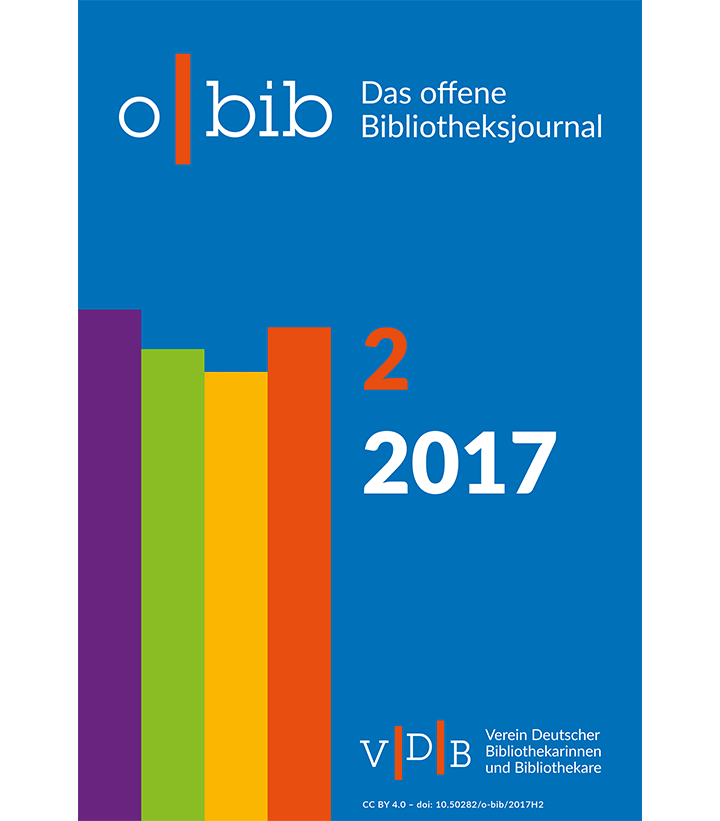Wie steht es um die Informationskompetenz von Erwachsenen? Eine Auswertung der PIAAC-Studie
DOI:
https://doi.org/10.5282/o-bib/2017H2S72-82Schlagwörter:
Informationskompetenz, Erwachsene, PIAAC-Studie, Lebenslanges LernenAbstract
Die Vermittlung von Informationskompetenz konzentriert sich in Deutschland auf Studierende und Schüler. Erwachsene tauchen in den Schulungskonzepten nur am Rande auf, wodurch nichts über ihren Wissensstand bekannt ist. Aufbauend auf einem Vorschlag von Catts und Lau des Information for All Programme (UNESCO) wurde die PIAAC-Studie, welche Grundkompetenzen von Erwachsenen prüft, auf Indikatoren für Informationskompetenz untersucht.
In Germany, instruction of information literacy focuses on students and pupils. In current information literacy programs, adults are perceived as a target group of marginal importance. Consequently, not much is known about their level of information literacy. Building on a suggestion by Catts and Lau from the Information for All Programme (UNESCO), the study of adult competencies PIAAC was examined with respect to indicators of information literacy.
Literaturhinweise
American Library Association. „Presidential Committee on Information Literacy: Final Report.“ Zuletzt geprüft am 31.08.2016. http://www.ala.org/acrl/publications/whitepapers/presidential.
Arbeitsgruppe Informationskompetenz Bibliotheksverbund Bayern, Hrsg. „Standards der Informationskompetenz für Schülerinnen und Schülern: Das Angebot der wissenschaftlichen Bibliotheken.“ Zuletzt geprüft am 31.08.2016. http://zpidlx54.zpid.de/wp-content/uploads/2016/02/Standards_IK_Schulen_2.pdf.
Balceris, Michael. „Medien- und Informationskompetenz: Modellierung und Messung von Informationskompetenz bei Schülern.“ Dissertation, Erziehungswissenschaftliches Institut Universität Paderborn, 18.11.2011. Zuletzt geprüft am 30.08.2016. http://digital.ub.uni-paderborn.de/hs/content/titleinfo/326245.
Bundesministerium für Bildung und Forschung, Hrsg. „PISA & Co. Die wichtigsten Bildungsvergleichsstudien im Überblick.“ Zuletzt geprüft am 29.08.2016. https://www.bmbf.de/pub/Pisa_und_Co.pdf.
Campbell, Sandra. „Defining Information Literacy in the 21st Century.“ Buenos Aires, 22.08.2004. Zuletzt geprüft am 31.08.2016. https://www.researchgate.net/profile/Sandra_Campbell7/publication/237652967_Defining_Information_Literacy_in_the_21st_Century/links/546a22780cf2397f78301281.pdf.
Catts, Ralph und Jesús Lau. Towards Information Literacy Indicators. UNESCO. Information for All Programme (IFAP).: Edited by the Information Society Division, Communication and Information Sector. Paris, 2008. Zuletzt geprüft am 31.08.2016. http://portal.unesco.org/ci/en/files/26348/12070387513Towards_Information_Literacy_Indicators-_final_version.doc/Towards%2BInformation%2BLiteracy%2BIndicators-%2Bfinal%2Bversion.doc.
Dienstleistungskommission des Deutschen Bibliotheksverbandes, Hrsg. „Nationale Standards der Informationskompetenz für Studierende.“ Zuletzt geprüft am 31.08.2016. http://zpidlx54.zpid.de/wp-content/uploads/2015/02/DBV_Standards_Infokompetenz_03.07.2009_endg.pdf.
Gapski, Harald und Thomas Tekster. Informationskompetenz in Deutschland: Überblick zum Stand derFachdiskussion und Zusammenstellung von Literaturangaben, Projekten und Materialien zu einzelnen Zielgruppen. Düsseldorf: Landesanstalt für Medien Nordrhein-Westfalen (LfM), 2009. Zuletzt geprüft am 29.08.2016. http://lfmpublikationen.lfm-nrw.de/index.php?view=product_detail&product_id=147.
Ingold, Marianne. Das bibliothekarische Konzept der Informationskompetenz: Ein Überblick. Berliner Handreichungen zur Bibliothekswissenschaft 128. Berlin: Institut für Bibliothekswissenschaft der Humboldt-Universität zu Berlin, 2005. Zuletzt geprüft am 30.08.2016. http://www.ib.hu-berlin.de/~kumlau/handreichungen/h128/.
Koepernik, Claudia. „Informationskompetenz als Schlüsselqualifikation für Lebenslanges Lernen.“ In Sühl-Strohmenger, Handbuch Informationskompetenz, 49–56.
Meyer, Anne-Kathrin. „Empirische Erfassung von Informationskompetenz.“ In Sühl-Strohmenger, Handbuch Informationskompetenz, 42–51.
OECD. Literacy, Numeracy and Problem Solving in Technology-Rich Environments: Framework for the OECD Survey of Adult Skills. 2012. Paris: OECD Publishing, 2013. Zuletzt geprüft am 02.09.2016. http://www.oecd.org/skills/piaac/PIAAC%20Framework%202012--%20Revised%2028oct2013_ebook.pdf.
OECD. OECD Skills Outlook 2013: First Results from the Survey of Adult Skills. Paris: OECD Publishing, 2013. Zuletzt geprüft am 02.09.2016. http://www.oecd.org/skills/piaac/Skills%20volume%201%20(eng)--full%20v12--eBook%20(04%2011%202013).pdf.
OECD. The Survey of Adult Skills: Reader’s Companion. 2. Aufl. OECD Skills Studies. Paris: OECD Publishing, 2016. Zuletzt geprüft am 30.08.2016. http://www.oecd.org/education/the-survey-of-adult-skills-9789264258075-en.htm.
Rammstedt, Beatrice, Hrsg. Grundlegende Kompetenzen Erwachsener im internationalen Vergleich: Ergebnisse von PIAAC 2012. Unter Mitarbeit von Daniela Ackermann et al. Münster: Waxmann, 2013. Zuletzt geprüft am 29.08.2016. http://nbn-resolving.de/urn:nbn:de:0168-ssoar-360687.
———„PIAAC 2012: Die wichtigsten Ergebnisse im Überblick.“ In Rammstedt, Grundlegende Kompetenzen Erwachsener im internationalen Vergleich, 11–20.
Rammstedt, Beatrice und Anouk Zabal. „Das Programme for the International Assessment of Adult Competencies (PIAAC).“ In Rammstedt, Grundlegende Kompetenzen Erwachsener im internationalen Vergleich, 21–9.
Schmidt-Hertha, Bernhard. „PIAAC- Rezeption und Interpretation.“ DIE Zeitschrift für Erwachsenenbildung, Nr. 3 (2014): 33–35. Zuletzt geprüft am 30.08.2016. http://www.die-bonn.de/zeitschrift/32014/kompetenz-06.pdf.
Schmidt-Hertha, Bernhard und Karin J. Rott. „Problemlösen im Internet: Theoretische und methodische Verortung eines neuen (?) Konzepts.“ REPORT. Zeitschrift für Weiterbildungsforschung 37, Nr. 3 (2014): 38–48.
Stöcklin, Nando. „Informations- und Kommunikationskompetenz - das "Lesen und Schreiben" der ICT-Kultur.“ MedienPädagogik – Zeitschrift für Theorie und Praxis der Medienbildung, 2012. Zuletzt geprüft am 30.08.2016. http://www.medienpaed.com/globalassets/medienpaed/2012/stoecklin1206.pdf.
Sühl-Strohmenger, Wilfried, Hrsg. Handbuch Informationskompetenz. Berlin: De Gruyter Saur, 2012.
———, Hrsg. Handbuch Informationskompetenz. 2., aktual. Auflage. Berlin: De Gruyter Saur, 2016.
———„Zur Einführung: Neudefinition von Informationskompetenz notwendig?“ In Sühl-Strohmenger, Handbuch Informationskompetenz, 1–5.
Vom Orde, Heike und Franziska Wein. „Entwicklungsstand und Perspektiven der Informationskompetenz in Deutschland.“ In Sühl-Strohmenger, Handbuch Informationskompetenz, 477–87.
Veröffentlicht
Ausgabe
Rubrik
Lizenz
Copyright (c) 2017 Helena Häußler

Dieses Werk steht unter der Lizenz Creative Commons Namensnennung 4.0 International.





